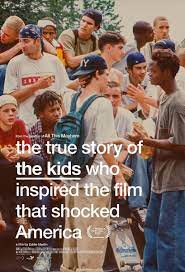
THE KIDS/WE WERE ONCE KIDS
Australia, 2021, 88 minutes, Colour.
Hamilton Harris, Jon Abrahams, Peter Bici.
Directed by Eddie Martin.
In 1995, an unusual drama featuring teenagers, Kids, was a sensation, winning awards and critical acclaim, but a source of contradiction for many groups, social workers, religious concerns. It became a commercial success, talked about, seen by large audiences, discussions, media programs.
Australian documentary director, Eddie Martin (films about skateboarders, street artists, the 2019-2020 bushfires) takes the audience back 26 years but also offers a perspective on the film and the atmosphere of the 1990s, especially in a neighbourhood in New York City.
The film has a great deal of archival footage from the period. Which means that an audience who has not seen the original Kids gets a fair and strong impression of what the film was about, its dramatic cinema style, the issues of the period. There are various footage interviews with film critics such as Roger Ebert who was strongly in favour. There is footage of the director, Larry Clark, a noted photographer who made a number of further films, not without controversy. The writer of the film, Harmony Korine, 19 at the time and from the neighbourhood, is glimpsed in the footage from the past. Clark and Korine declined to be interviewed for this documentary.
In the present, there is continued interview and narrative from one of the teenage stars of the original film, Hamilton Harris. He is co-producer of the film, wanting to have his say and perspective about what it was like to make the film, and the contact with fellow actors, especially Justin Pierce (who won some awards for his performance) and Harold Hunter. There is extensive footage of each of these young men, during the making, the aftermath, ambitions careers, success, death and suicides.
One criticism of this documentary is that the prominent stars, Rosario Dawson, Chloe Sevigny, Leo Fitzpatrick, were not interviewed (a glimpse or two of Rosario Dawson in past footage). The comment is made by the locals that the film was mainly about those who lived in the neighbourhood, amateurs, whereas the three stars were brought in from the outside, not part of the daily life dramatised in the film.
The picture of teenagers in New York is frank, the role of drugs and alcohol, sexual relationships, in the background of some poverty and lack of education. The invitation to become part of a feature film was attractive to these young people. Some money. There was criticism of the time and certainly afterwards that the filmmakers were exploiting them. With the footage and the contemporary interviews (especially by other stars of Kids who have survived and had careers, Jon Abrahams, Peter Bici, reminiscing about their lives, the film, the making, and the relationships with Pierce and Hunter).
There is a surprising discovery at the end of the film, an Australian who, after a long time, discovers that he is the father of Justin Pierce.
This documentary suggests that audiences might well go back to see Kids again or for the first time, comparing the picture of life in the neighbourhood in the 1990s with pictures of life there in succeeding decades. How much change, or not? And the same issues for teenagers and challenges?
One of the strong criticisms of the film at the time was: where the parents? They are notably absent in the original film – and the question of what life would be like for those participating if there had been some kind of adult guidance and/or control.
This is an interesting social documentary. It is also a must for those who love the movies and are intrigued by the backgrounds.